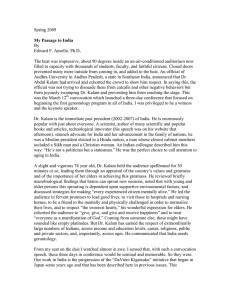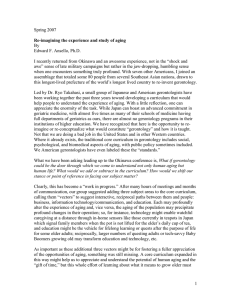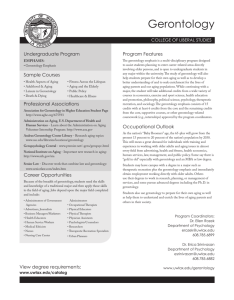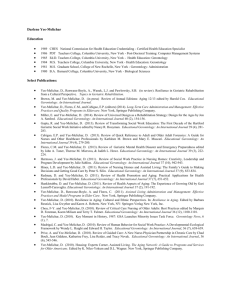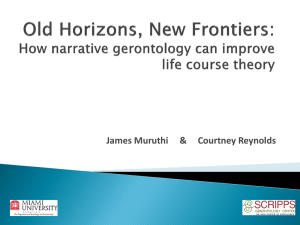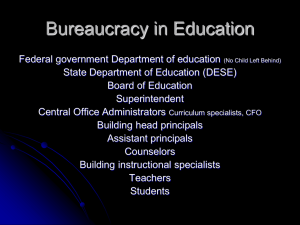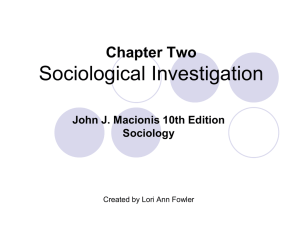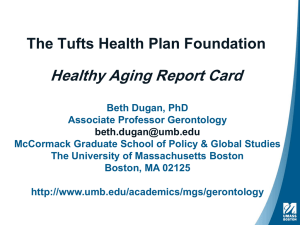Sociology of Aging (Soc 450G)
advertisement
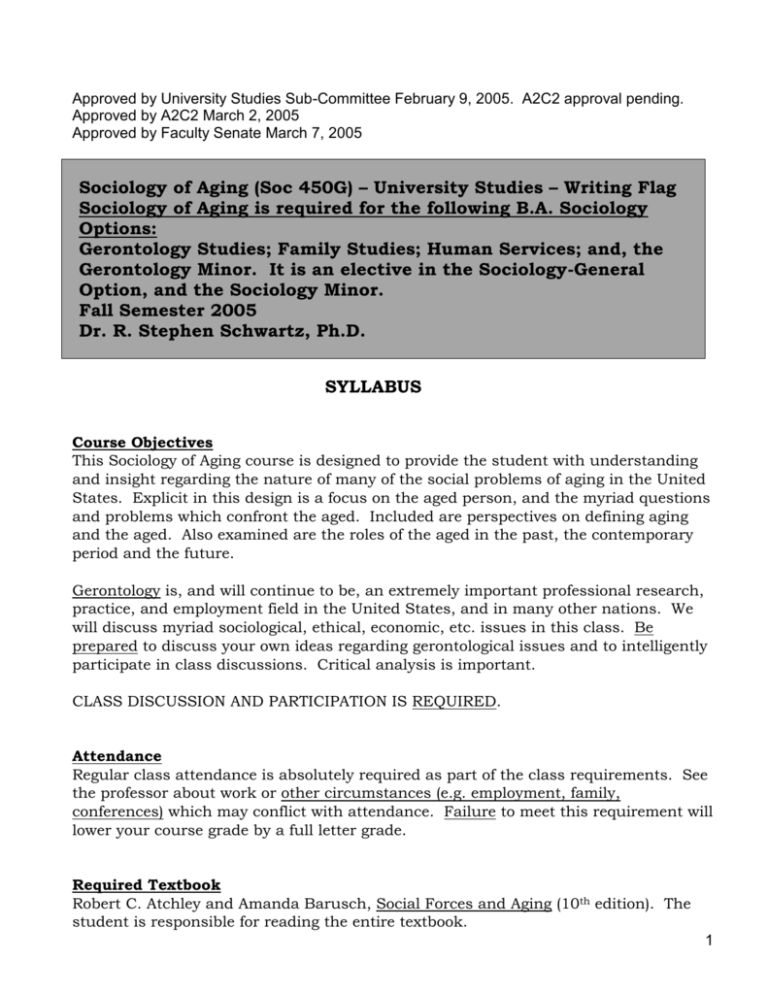
Approved by University Studies Sub-Committee February 9, 2005. A2C2 approval pending. Approved by A2C2 March 2, 2005 Approved by Faculty Senate March 7, 2005 Sociology of Aging (Soc 450G) – University Studies – Writing Flag Sociology of Aging is required for the following B.A. Sociology Options: Gerontology Studies; Family Studies; Human Services; and, the Gerontology Minor. It is an elective in the Sociology-General Option, and the Sociology Minor. Fall Semester 2005 Dr. R. Stephen Schwartz, Ph.D. SYLLABUS Course Objectives This Sociology of Aging course is designed to provide the student with understanding and insight regarding the nature of many of the social problems of aging in the United States. Explicit in this design is a focus on the aged person, and the myriad questions and problems which confront the aged. Included are perspectives on defining aging and the aged. Also examined are the roles of the aged in the past, the contemporary period and the future. Gerontology is, and will continue to be, an extremely important professional research, practice, and employment field in the United States, and in many other nations. We will discuss myriad sociological, ethical, economic, etc. issues in this class. Be prepared to discuss your own ideas regarding gerontological issues and to intelligently participate in class discussions. Critical analysis is important. CLASS DISCUSSION AND PARTICIPATION IS REQUIRED. Attendance Regular class attendance is absolutely required as part of the class requirements. See the professor about work or other circumstances (e.g. employment, family, conferences) which may conflict with attendance. Failure to meet this requirement will lower your course grade by a full letter grade. Required Textbook Robert C. Atchley and Amanda Barusch, Social Forces and Aging (10th edition). The student is responsible for reading the entire textbook. 1 General Course Outline: A Movable Feast of Topics The Scope of Social Gerontology Demography of Aging-U.S. Values, Roles, & Norms Changes & Adaptations in Later Life Employment & Retirement Health Services Sexuality Religion Dependency Sociological Theories & Aging Social Aging The Family Social Stratification Activities Economics & Politics Housing & Transportation Dying & Death Deviance Future Trends Other Areas of Interest Recommended Books A university-level dictionary (e.g. Webster). Required Examinations There will be four (4) multiple choice examinations (50 questions each = 200 points total) including the final. Examinations will cover the lectures and textbook. Unannounced in-class assignments may be given. Point requirements for exam grade: “a” = 155+; “b” = 145+; “c” = 130+; “d” = 129-120; Fail = 119 & below. Exam One, Ch 1-5 and lectures; Two, Ch 6-10 and lectures; Three, Ch 11-15 and lectures; Final, 1620 and lectures. The date for each exam will be announced at least one week before the exam. See Research Paper (II) for course grade explanation. Be prepared. NO books, notes, dictionaries, language translation devices, etc., are allowed. Any changes in the course requirements will be announced in class. 2 WRITING I. Article Analysis Select one article which is required to come from The Journals of Gerontology – Social Sciences and Psychological Sciences; nursing and pre-med students only may select an article from The Journals of Gerontology – Biological and Medical Sciences. No other sources for the Article Analysis will be accepted. Select an article which is relevant to your topic for the required Research Paper (see II). Incorporating sociological analysis, objectively explain the significance of the research in the article. Your analysis will be 2-4 pages in length, plus a photocopy of the abstract page from the Journal. Grammar and mechanics are always important. Students will be randomly assigned to a group of 4-5 students. The student will make copies of the analysis and abstract for other students in their group and the professor – the due date is (date). It is strongly recommended that each group meet outside of class at least once to discuss each other’s article analysis and writing – one class period will be used for students to meet in their groups. Constructive suggestions from their group regarding the sociological analysis (e.g. critical thinking) and writing (e.g. style, mechanics) will be shared in collaborative learning. Each student will revise his/her article analysis based on this collaboration, and the revision (2-4 pages) plus abstract will be given to the professor by (date). My written comments and the revision will be returned to the student with an evaluation of satisfactory, or not acceptable (the latter will require revision to satisfactory or the student will fail the course). Remember that the research in the Journal article must be included, with other scholarly research references, in the Research Paper. II. Research Paper Select two possible topics in social gerontology (i.e., the sociological study of aging) that you are interested in as a student that has relevance to your future profession, and/or personal interest. In one page for each topic, explain what you want to research, and note your first and second choice. These proposals are due by (date). I will approve, or not approve (i.e., revision is required) your proposal in writing. The length of the paper will be a minimum of 6 pages, to a maximum of 12-20 pages (excluding title page and bibliography). Well written (e.g. writing style, organization and coherence, grammar and mechanics) analytical papers will have a clearly stated sociological perspective and extensive use of one primary sociological theory and theorist (e.g. symbolic interaction – Herbert Blumer) in developing the student’s topic. Several books on sociological theory are on reserve in the WSU Library. Keep in mind that the topic reflects your originality, and the writing level should be construed as professional employment and/or graduate school quality. Use either APA or MLA format. One rough draft is required by (date). I will provide written comments and suggestions and return the rough draft to you. I will be pleased to meet with you (by appointment) to discuss your ideas and paper, including the suggestions on the rough draft, during the semester. 3 You may use the English Department Writing Lab. References must include research articles (including the article you analyzed in I) from The Journals of Gerontology – Social Sciences and/or Psychological Sciences sections. You will include research from other relevant scholarly research journals and books. You are required to use a sociological theory and theorist in the paper. Print sources only: No on-line, internet, self-published or vanity press drivel! Do not use our textbook as a reference, and no introductory-level textbook. Use academic sources for definitions of terminology. The research paper will be the primary determinant of your final course grade, and will be given substantial value as a measure of your academic accomplishments in Sociology of Aging. Examples: The student has an outstanding research paper, A, and an exam total of a “b,” the course grade is an A; an A paper and a “c” on the exams, the course grade is a B; a “b” on the exams and a C research paper, the course grade is a C; and, although this has happened only once a millennium ago, an “a” on the exams and a C paper, the course grade is a C. A D/Fail paper, regardless of the exam scores, is a D/Fail in the course. The paper is due by (date). Your final paper with grade and appropriate accolades will be returned to you. Employers want professionals who can write well, and an A/B paper included in a resumé looks great in an employment application. If you anticipate graduate school (excluding “online,” “non-traditional,” “individualized study,” and similar types), you must write well. Writing requirements are designed to give the university student an opportunity to enhance the student’s writing and research skills: A. Practice the processes and procedures for creating and completing successful writing in their fields. University students must attain a professional standard of writing, regardless of their major, that meets (or exceeds) the requirements of their major and profession after graduation. In the field of gerontology, there are and will continue to be excellent employment opportunities, which include (as examples;): nursing home, assisted care, and long-term care management; human service and human resources; legal services; geriatric nursing and medical care; advertising and marketing; social work; recreation and physical therapy; corporate and private areas of health care (e.g. hmo’s, hospitals ); and, local government and state programs for the elderly (e.g. home care, hospice, senior centers). Writing skills must be commensurate with requirements of professional employment and for students who choose to do so, traditional graduate school programs. Knowledge of relevant academic journals and other literature in the field of gerontology will be expanded through the excellent holdings in the WSU library. Students are required to include research from The Journals of Gerontology (Social Sciences/Psychological Sciences) in the paper. 4 B. Understand the main features and uses of writing in their fields. Theoretical and empirical research in gerontology and sociology will be included (cited) in the paper. Empirical research studies will be emphasized, e.g. identifying and defining the issue or problem, objectively examining and analyzing these points, and providing realistic and pragmatic explanations and conclusions. C. Adapt their writing to the general expectations of readers in their fields. Critical analysis – not merely criticism for the sake of criticizing – of selected research cited and the focus issue of the student’s paper is required. As a formal paper, grammar and mechanics are included in grading. Students should think of this paper, i.e., their research and writing, as an inclusion in a resume in applying for employment and/or graduate school. It is a paper written by a university student for professionals (i.e., “expectations of readers in their fields.”) – a potential employer and/or professors on a graduate school admissions committee. D. Make use of the technologies commonly used for research and writing in their fields. The student will use legitimate scholarly research and have access to the research through, for example, the WSU Library and the student’s own technology (e.g. computer, laptop). However, no on-line, internet, self-published, or vanity-press drivel will be allowed. E. Learn the conventions of evidence, format, usage, and documentation in their fields. Every student will have had at least two university-level English courses. It is strongly recommended that the student use the English Department’s Writing Lab for the rough draft(s) and final paper. Use either the Modern Language Association or the American Psychological Association format. The professor will meet with each student several times during the semester to discuss the development of the paper. One rough draft is required, and clear guidance, criteria regarding quality and content, and suggestions for enhancing writing style and mechanics will be provided in writing, as part of my professional responsibility for my students. Office Periods M,W,F, 7:30-8:00 am; M,W, 11:00-12:00. Other office periods by appointment - please make appointments in advance directly with me. Please: No e-mail and no voice mail. OFFICE: PHONE: DEPARTMENT PHONE: Minné 224 457-5422 (no voice mail) 457-5420 (voice mail) 5

